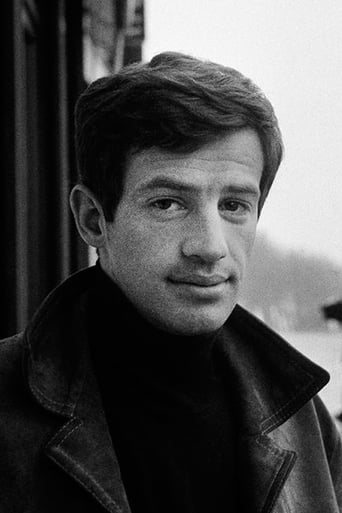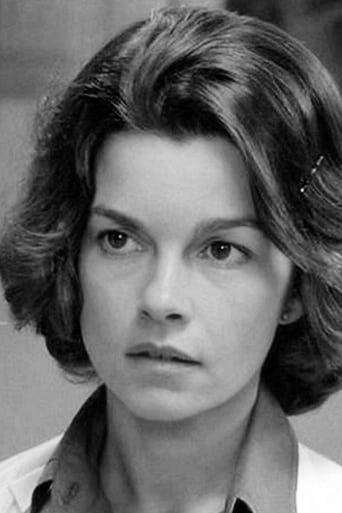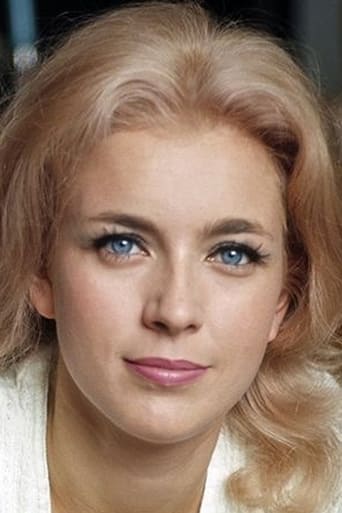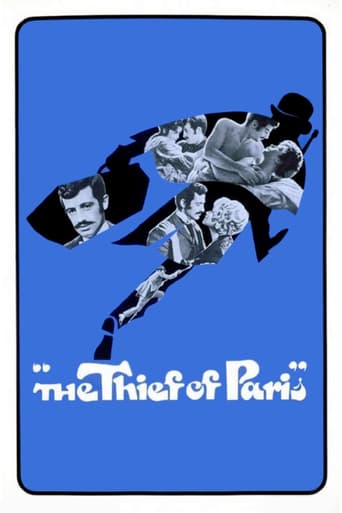
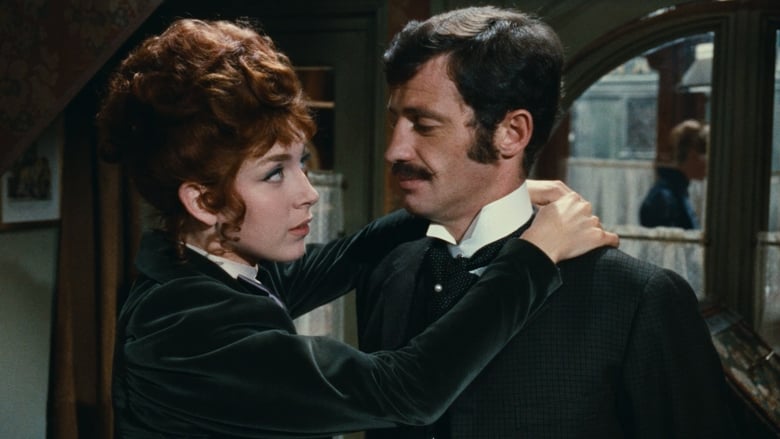
The Thief of Paris (1967)
In Paris around 1900, Georges Randal is brought up by his wealthy uncle, who steals his inheritance. Georges hopes to marry his cousin Charlotte, but his uncle arranges for her to marry a rich neighbour. As an act of revenge, Georges steals the fiance's family jewels, and enjoys the experience so much that he embarks upon a life-time of burglary.
Watch Trailer
Cast


Reviews
THE THIEF OF Paris certainly is not Louis Malle's most illustrious work, pales in comparison with classics like ELEVATOR TO THE GALLOWS (1958, 8/10), THE FIRE WITHIN (1963, 9/10), LACOMBE, LUCIEN (1974, 8/10), or even his Hollywood legacies as Atlantic CITY (1980, 7/10) and VANYA ON 42ND STREET (1994, 7/10), but it might be his brightest and the most nihilistic. In Malle's film, burglary is not a disgrace profession at all, and Georges Randal (Belmond) is a very promising one, with his bourgeois upbringing and extraordinary composure. His first go is an act of revenge to sabotage his cousin Charlotte's (Bujold) arranged marriage organized by his rapacious uncle Urbain (Lude), who raises him up but also appropriates properties of George's deceased parents. So he has to leave, accidentally joined by two habitual thieves, the priest Félix (Guiomar) and Roger-La-Honte (Le Person). Together, Georges marches on successfully and gets flirty with several women, Broussaille (Jobert), Roger's brothel-running sister in London; Ida (Fabian), one of her girls; Renée (Sarcey), the wife of his college mate Mouratet (Crouzet) and Genevière (Dubois), an unhappily married wife, who also wants to rob her husband blind. Most of the time, the film embraces a nonchalant casualness in the supposedly highly- surreptitious activities, minutely showing viewers the details of breaking-in a villa, prising open a safe box or using caustic acid, meanwhile bourgeois class again is under the lash of Malle's wielding, the ultimate shame is Urbain on his death bed, he has to watch Georges feasibly falsify his will and Charlotte utter that she has no sympathy to him at all. Career hazard matters, particular for thieves, but Georges is the kind (one we are all too familiar with) that cannot stop even he patently comprehends the aftermath, because it is the danger is beckoning them to act, to induce the thrill and fulfillment his life needs, so in the final act, Malle mischievously lures us into a paranoiac game reflected from George's mind, then calmly ends the film, an anticlimax fits this generally unexciting adventure. There are nothing too thrilling for the cast to do either, Belmondo might not be the romantic type, but as rakish as he could be, Guiomar liberates some deadpan seriousness of juggling his holy vocation with mundane misdeeds. Belles are all over the maps (Bujold, Sarcey, Dubois, Fabian, even Lafont in her small part as a very French maid), but never arouse too much frisson in their auxiliary functions, really a pity.
Georges Randal, the rogue bandit that terrorized rich people in France, as well as in Belgium and England, was a man cheated from his own inheritance by an uncle that decided to concentrate in marrying Georges' own cousin, Charlotte, giving her a dowry that would guarantee her a good marriage. Georges began a spree of thefts that made him one of the most sought after bandits of the time. One thing that distinguished Randal was the ruthlessness in which he attacked the treasured objects of its owners. Georges loved Charlotte, but it their union was not going to happen because the uncle Urbain, saw to it Georges did not have a chance. Georges allied himself to a catholic priest who knew where to strike, passing himself for a saintly man of the cloth. They fooled everybody with their wit and resoluteness.Based on the novel by George Darien, Louis Malle and his collaborator Jean-Claude Carriere took the task to bring the novel to the screen, adapting it to fit the style for which the director was famous for. They opened the action, although the only fault is that it would have made a better picture if it would have been trimmed a bit because there are things that are repeated that should have been eliminated.In Jean-Paul Belmondo they found the ideal actor to carry the film. The actor, at the heart of his popularity, did what he could with his Randal, although there are times when he is bogged down by the screenplay. Genevieve Bujold, makes a ravishing creature to look, although she is only briefly at the beginning and at the end. Julien Giomar makes a valuable contribution as the Abbe La Margelle, the rogue priest behind some of the capers performed by Randal. Marie Dubois, Christian Lude, Francoise Fabian, the wonderful Marlene Jobert, add luster to the supporting cast. Bernadette Lafont, an excellent actress appears only briefly in the film.
... and those gorgeous eyes to look at. The film would be a lot better if it were 30 minutes shorter, and if Malle didn't lovingly photograph those rich interiors, that gorgeous furniture that Belmondo treats so brutally with his burglar tools. Jacques Saulnier did the production design, and this is a really handsome film to watch. It is a precursor to Stavisky..., the Resnais film that Belmondo starred in some years later, another Saulnier production. The solitary nature of the crimes Randal commits does not allow the idea of a confederation of criminals against the bourgeoisie to develop--this is one of the themes of the script that fails to work.The acting is always good. Guiomar as the crooked priest is always effective; you may remember him longer than you do Belmondo. Paul Le Person as a thief has some good scenes, as does Jacques Debary as the politician Randal robs while he's making a speech. The best scene for me was the Guiomar-Marie Dubois encounter, when she recounts a bogus story to the feigned surprise of the priest.Louis Malle was one of the greatest French directors, along with Resnais and Chabrol, yet he didn't always make the films that his talent should have let him do. Le Voleur is just too ripe, too pretty, too focused on surfaces to work for me.
I finally got around to watching a tape of this movie I'd made awhile back, and frankly, I was very disappointed. Jean-Paul Belmondo at the peak of his international fame, Louis Malle ("Atlantic City") directing - how could it go wrong? But regardless, this is just a simple comedy without much depth.Belmondo plays a French thief around the turn of the century, and the joke is that he and his fellow thieves are robbing the bourgeois and making off with their women. No new ground is broken, and to be honest, even with this simple plot, it isn't particularly well-executed.Even fans of Belmondo might be bored with this film - instead of his usual droll demeanor, he's dull and just floats from one scene to another without making much of an impact.So-so entertainment, that's all.


